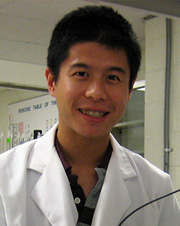Baylor Geology Professor Receives Marie Curie Fellowship to Research in Europe

Dr. Boris Lau, assistant professor of geology at Baylor, is the Baylor faculty member to receive a Marie Curie Fellowship, which will provide $300,000 for a future study in Europe.
Follow us on Twitter: @BaylorUMediaCom
A Baylor University geology professor has been awarded a Marie Curie Fellowship that will provide more than $300,000 for a future research study in Europe.
Dr. Boris Lau, assistant professor of geology at Baylor, is the first professor at Baylor to be selected as a Marie Curie Fellow. The award will allow Lau to investigate the role of microbial metabolites in metal sorption on mineral surfaces at the nano-scale.
Lau will spend the next six months researching at the University of Copenhagen in Denmark, an international leader in geochemistry.
"The behavior of metals, many of which are toxic even in trace quantities, is an important topic as population growth puts pressure on the world's drinking water resources, " Lau said. "This study lies at the intersection of geoscience, surface physics and biointerface science and uses an interdisciplinary approach to answer questions at the crossover of environmental bio- and geochemistry that are critical for society. I am truly grateful to receive this fellowship that will fund this exciting research."
Lau said the results will provide insights for the water industry, so treatment can be improved by providing criteria for selecting bacteria that can synthesize particular metabolites to immobilize specific toxic metals.
This study will create leverage for long-term collaborations between Baylor and the University of Copenhagen. Baylor's support through the C. Gus Glasscock, Jr. Endowed Fund for Excellence in Environmental Sciences enables doctoral students in Lau's lab to spend a month at the University of Copenhagen for the enhancement of their dissertation research.
About the Fellowship
The Marie Curie Fellowship program is part of a series of European Union research funded actions that supports the on-going training, research and mobility of highly qualified scientists within Europe and the rest of the world.
Marie Curie was a famous European chemist known for her pioneering research on radioactivity. She was the first person honored with two Nobel prizes in physics and chemistry.
About Baylor University
Baylor University is a private Christian university and a nationally ranked research institution, classified as such with "high research activity" by the Carnegie Foundation for the Advancement of Teaching. The university provides a vibrant campus community for approximately 15,000 students by blending interdisciplinary research with an international reputation for educational excellence and a faculty commitment to teaching and scholarship. Chartered in 1845 by the Republic of Texas through the efforts of Baptist pioneers, Baylor is the oldest, continually operating university in Texas. Located in Waco, Texas, Baylor welcomes students from all 50 states and more than 80 countries to study a broad range of degrees among its 11 nationally recognized academic divisions.
Media contact: Frank Raczkiewicz, Assistant Vice President of Media Communications, 254-710-1964.